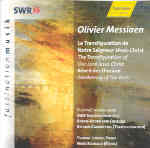This, Messiaen’s most overtly doctrinaire large work, probably will never be popular for just that reason. The loopy text, awkward vocal writing, and sheer length of the thing count against it, though so far it has enjoyed at least four fine recordings, including the excellent recent one by Chung on DG. This newcomer certainly belongs in the same league: it has even better choral singing (at least in the Gospel recitations where the men really do sound like monks singing a very spacey sort of chant) and offers playing that is just as secure and colorful. Although the backward balance of the full chorus buries the words in the two big chorales that close each of the work’s two parts (not exactly a loss, let’s face it), the result has a sort of transcendental glow, of voices and instruments melded, that the composer surely would have enjoyed.
Compared to Chung’s suave and comparatively mellow instrumental sonorities, Sylvain Cambreling’s brass and percussion have greater presence and really do plumb the heights and depths of sonority, while his soloists (including pianist Florent Boffard) are every bit as impressive. Overall, orchestral textures sound slightly rougher and the work thus a touch thornier, but also a bit more colorful and imposing. In terms of tempo, there’s little to choose between the various performances, though Chung’s subtle projection of the music’s entire span remains particularly cohesive. In short, if you want to experience this work in a way that is easiest on the ear, go with Chung. If you want maximum sonic impact and perhaps the more “spiritual” experience, this extremely well recorded set will be hard to beat.
But wait! There’s a bonus of considerable interest in the form of a radio recording of Réveil des Oiseaux featuring Hans Rosbaud and the composer’s (eventual) wife, pianist Yvonne Loriod, made in 1953 prior to the world premiere. Captured in clear, very dry mono sound, it’s a thoroughly professional piece of work from all concerned. Of course anything Rosbaud does will be interesting to collectors, though this isn’t exactly music that displays a conductor’s interpretive or expressive skills to finest effect. Still, it’s a testament to the Baden-Baden orchestra of 1953, source of so many excruciatingly bad recordings of standard repertoire (during this same period), that it handles Messiaen’s idiom so well. Actually, Rosbaud’s recording of the Turangalila-symphonie on Wergo, while hardly up to modern standards, wasn’t too terrible either.
As for Loriod’s uniquely lyrical and commanding way with her husband’s piano writing, she made a superb digital recording of the Réveil for Erato that arguably makes stronger claims for the work itself. However, taking this performance in tandem with the excellent Transfiguration, the combination looks pretty tough to beat on grounds both artistic and historical. Strongly recommended to Messiaeniacs.
































